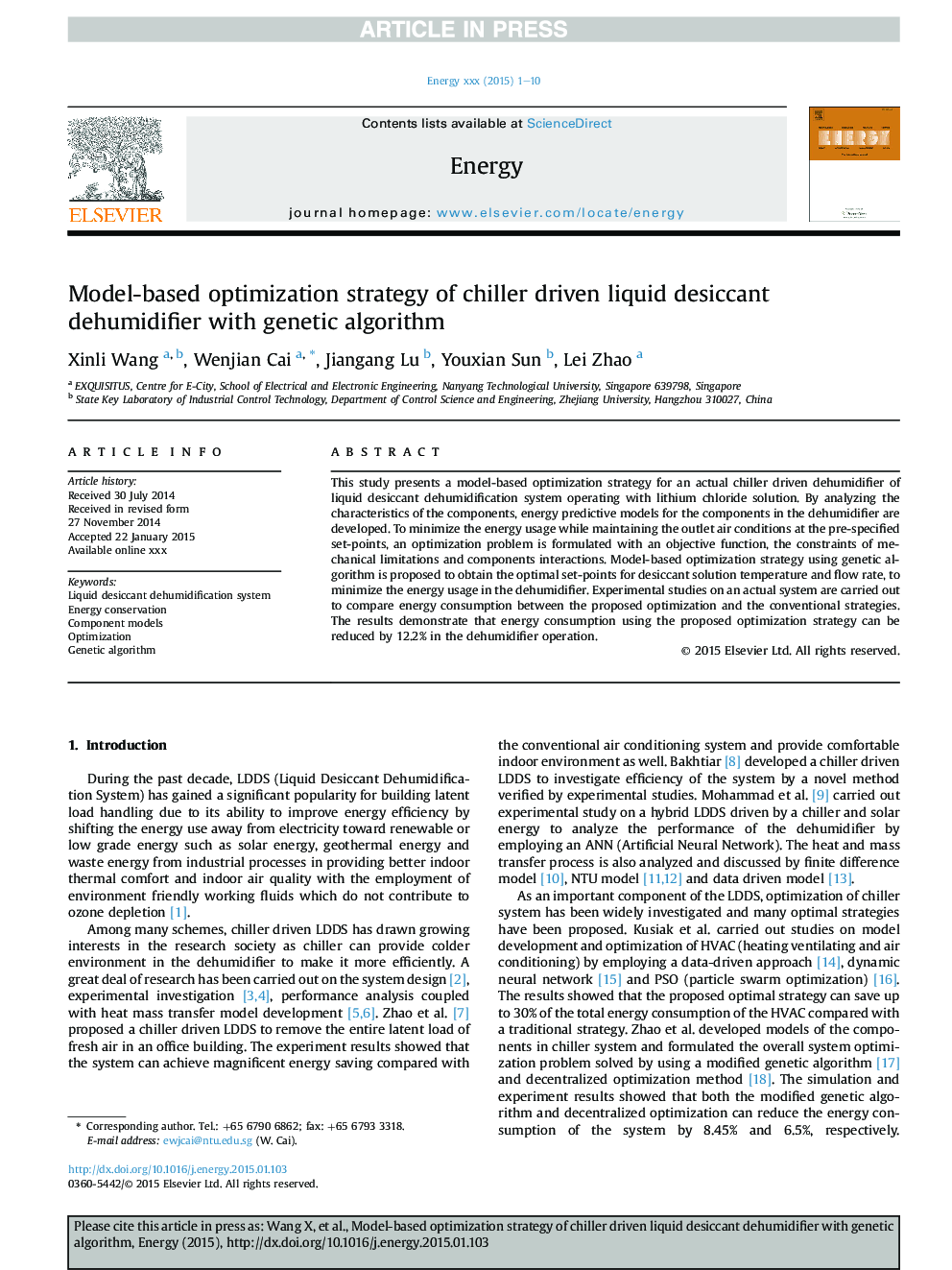| کد مقاله | کد نشریه | سال انتشار | مقاله انگلیسی | نسخه تمام متن |
|---|---|---|---|---|
| 8075528 | 1521464 | 2015 | 10 صفحه PDF | دانلود رایگان |
عنوان انگلیسی مقاله ISI
Model-based optimization strategy of chiller driven liquid desiccant dehumidifier with genetic algorithm
ترجمه فارسی عنوان
استراتژی بهینه سازی مدل مبتنی بر مدل رطوبت ساز مایع خنک کننده مایع با الگوریتم ژنتیک
دانلود مقاله + سفارش ترجمه
دانلود مقاله ISI انگلیسی
رایگان برای ایرانیان
کلمات کلیدی
سیستم رطوبت مایع خشک کن، حفاظت انرژی، مدل های کامپوننت، بهینه سازی، الگوریتم ژنتیک،
ترجمه چکیده
این مطالعه یک استراتژی بهینه سازی مبتنی بر مدل برای یک رطوبت گیر رانش واقعی سیستم خنک کننده مایع خنک کننده که با محلول لیتیم کلرید عمل می کند ارائه می دهد. با تجزیه و تحلیل ویژگی های اجزاء، مدل پیش بینی انرژی برای اجزای رطوبت ساز توسعه می یابد. برای به حداقل رساندن مصرف انرژی در حالی که حفظ شرایط هوای خروجی در مقادیر پیش تعیین شده، یک مشکل بهینه سازی با یک تابع هدف، محدودیت محدودیت های مکانیکی و تعامل اجزای تشکیل می شود. استراتژی بهینه سازی مبتنی بر مدل با استفاده از الگوریتم ژنتیکی برای به دست آوردن مقادیر بهینه برای دمای محلول خشک کننده و سرعت جریان، برای به حداقل رساندن مصرف انرژی در رطوبت ساز پیشنهاد می شود. مطالعات تجربی بر روی یک سیستم واقعی برای مقایسه مصرف انرژی بین بهینه سازی پیشنهادی و استراتژی های معمول انجام می شود. نتایج نشان می دهد که مصرف انرژی با استفاده از استراتژی بهینه سازی پیشنهاد شده می تواند در 12.2٪ در عملیات رطوبت ساز کاهش یابد.
موضوعات مرتبط
مهندسی و علوم پایه
مهندسی انرژی
انرژی (عمومی)
چکیده انگلیسی
This study presents a model-based optimization strategy for an actual chiller driven dehumidifier of liquid desiccant dehumidification system operating with lithium chloride solution. By analyzing the characteristics of the components, energy predictive models for the components in the dehumidifier are developed. To minimize the energy usage while maintaining the outlet air conditions at the pre-specified set-points, an optimization problem is formulated with an objective function, the constraints of mechanical limitations and components interactions. Model-based optimization strategy using genetic algorithm is proposed to obtain the optimal set-points for desiccant solution temperature and flow rate, to minimize the energy usage in the dehumidifier. Experimental studies on an actual system are carried out to compare energy consumption between the proposed optimization and the conventional strategies. The results demonstrate that energy consumption using the proposed optimization strategy can be reduced by 12.2% in the dehumidifier operation.
ناشر
Database: Elsevier - ScienceDirect (ساینس دایرکت)
Journal: Energy - Volume 82, 15 March 2015, Pages 939-948
Journal: Energy - Volume 82, 15 March 2015, Pages 939-948
نویسندگان
Xinli Wang, Wenjian Cai, Jiangang Lu, Youxian Sun, Lei Zhao,
